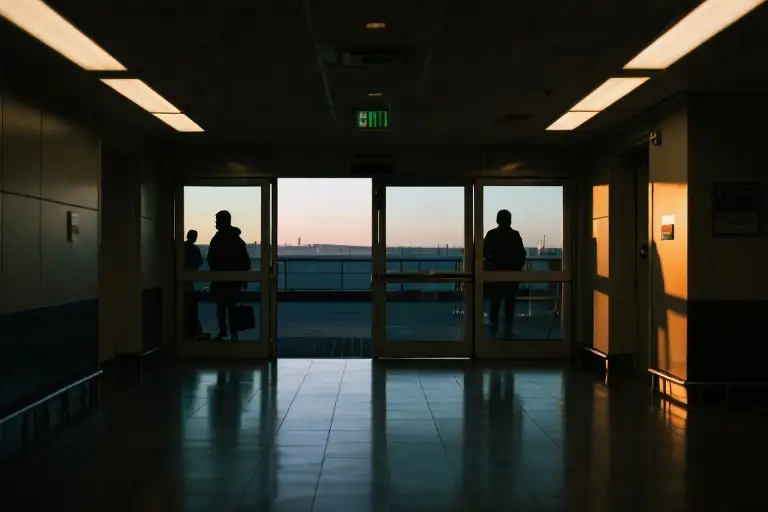The words still echo in my mind after all these years, sharp and unforgiving: “I’ll never marry you as long as you’re fat.” Twenty winters have passed since that moment at the airport, yet the memory hasn’t faded—the way her face crumpled like paper, the sudden silence between us where there had been laughter just minutes before. What shocks me most isn’t that she’d used older photos online (though that stung), but how easily cruelty spilled from my mouth, disguised as some twisted form of honesty.
That sliding glass door at the arrivals terminal became a metaphor I didn’t understand then. The mechanical whoosh as it parted felt like the universe holding its breath. Beyond it stood a woman whose crime was looking different from her profile pictures, and behind me trailed twenty-two years of carefully cultivated caution—all undone by three months of late-night messages with a stranger.
The plane ride itself should have been warning enough. My knuckles stayed white the entire flight, fingers permanently indented into the armrests. Every bit of turbulence felt like divine intervention trying to shake sense into me. Yet there I was, walking toward a woman whose only real deception was believing someone who claimed to love her wouldn’t care about dress sizes.
What fascinates me now isn’t our failed romance, but how two people could stand in the same airport smelling the same pretzel stands and hearing the same gate announcements, yet experience completely different realities. She saw a first meeting; I saw a betrayal. The Starbucks cup trembling in her hands held coffee; mine held cowardice masking as righteousness.
Airports have a way of suspending normal rules. Maybe that’s why ordinary people make extraordinary decisions in terminals—proposing to sweethearts, abandoning carefully packed luggage, or in my case, mistaking personal preferences for moral high ground. The fluorescent lights made everything look harsher that day, especially my own reflection in those glass doors when I finally walked back through them alone.
The Reckless Decision
For twenty-two years, my feet had stayed firmly planted on the ground. The very idea of flying sent my conservative, risk-averse self into cold sweats. I’d perfected the art of road trips, bus routes, and any alternative that kept me from boarding what I saw as a metal death trap. Yet there I was, credit card in hand, purchasing a one-way ticket to meet someone who existed only in pixels and late-night messages.
The irony wasn’t lost on me. While my college friends were backpacking through Europe or jumping out of planes for fun, I’d built a reputation as the guy who double-checked expiration dates and always carried hand sanitizer. Safety wasn’t just a preference—it was my personality. Until her.
We met in one of those early 2000s chat rooms that smelled like dial-up connections and unlimited potential. Her username popped up—something poetic about moonlight—and within weeks, we’d graduated to hour-long phone calls where she’d describe the lavender fields near her apartment while I diagrammed my entire family tree. The connection felt electric in a way my carefully controlled life never had.
Her photos showed a woman who belonged on magazine covers—smooth dark hair, eyes that promised adventure, a smile that made my stomach flip. She sent voice notes reading Neruda poems, and I’d play them on loop while staring at ceiling cracks in my studio apartment. When she suggested meeting, my gut reaction was to invent excuses. But something about her laugh through the phone lines made me hesitate.
For three nights, I lay awake measuring risk against reward. The statistics about plane crashes played in my head like a morbid slideshow. I researched train routes (53 hours with transfers) and even considered driving (2,100 miles through six states). But the truth was simpler: I wanted to believe in the version of myself who could do reckless, romantic things. The man who might deserve someone who quoted Neruda.
Clicking ‘purchase’ on that plane ticket felt like severing an anchor chain. My hands shook enough that I had to enter the credit card number twice. The confirmation email arrived with a cheerful ‘Bon voyage!’ that seemed to mock my terror. I spent the next two weeks oscillating between giddiness and nausea, packing and unpacking my suitcase, rehearsing conversations in the shower.
My parents, normally vocal about their opinions, stayed suspiciously quiet when I mentioned the trip. Maybe they recognized this as the first spontaneous decision of my adult life. Or perhaps they understood that some lessons can’t be taught—only lived.
The morning of the flight, I wore my lucky shirt (washed three times to remove the store smell) and arrived at the airport four hours early. Every boarding announcement made my pulse spike. When they finally called my zone, I walked down the jetway like a condemned man, gripping my carry-on until my knuckles whitened.
As the plane lifted off, I realized with sudden clarity why people take these risks. Not despite the fear, but because of it. That moment of weightlessness when the wheels leave the ground—it’s the closest thing to faith I’ve ever known.
Behind the Arrival Gate
The sliding doors parted with that mechanical sigh unique to airports – a sound that always carries equal parts promise and finality. Fluorescent lights reflected off polished floors, blending with the golden afternoon sun streaming through floor-to-ceiling windows. Somewhere overhead, a garbled announcement about baggage claim competed with the rhythmic clatter of suitcase wheels and the murmur of a hundred reunions.
My palms were slick against the strap of my carry-on. Twenty-two years of avoiding planes, undone by three months of late-night AIM conversations with a girl whose laugh sounded like wind chimes in my headphones. The rational part of me knew this was insane – my conservative upbringing screamed warnings about internet strangers – but my fingers had already typed the flight confirmation number into the kiosk.
Then I saw her.
Not the willowy brunette from the carefully angled Myspace photos, but a woman whose silhouette blocked the Arrivals gate lights. She stood perfectly still amid the flowing crowd, one hand nervously adjusting the hem of a sundress that clung differently than it had in our video chats. The way her shoulders hunched forward told me she knew. Knew that the strategic cropping and flattering angles had collapsed under fluorescent airport lighting.
Our eyes met through the shifting bodies between us. Her smile flickered – that same warm curve I’d fallen for pixel by pixel – then faltered when my own expression froze. Something heavy settled in my stomach as I registered the math: the girl I’d flown halfway across the country to meet had easily doubled the weight her photos suggested.
‘You’re…’ I began, then swallowed the rest. Her face did that thing where it tries not to show it’s breaking. Behind us, a child squealed as someone lifted them into an embrace. The scent of overpriced airport coffee mixed with her vanilla perfume.
Her fingers twisted the strap of her purse. ‘Not what you expected?’ The words came out quiet, almost resigned. Not angry. Not yet.
I should have lied. Should have mustered some version of the charming banter that flowed so easily through dial-up connections. Instead, I heard myself say the thing we were both thinking: ‘Your pictures… they were older, weren’t they?’
A muscle jumped in her jaw. When she spoke again, her voice had that dangerous calm of someone holding back a storm. ‘I sent you videos last week.’
‘With filters.’ The accusation hung between us. I watched her eyes dart to my own body – the same average build I’d never bothered to enhance or disguise online. The hypocrisy tasted metallic on my tongue.
She took a step back, her shoulders squaring in a way that made her suddenly seem larger. ‘You flew here because you wanted the fantasy,’ she said, each word measured. ‘Not me.’
Around us, the airport continued its oblivious symphony – boarding calls, laughter, the hiss of an arriving train. But in that bubble of silence between two people realizing they’d fallen for illusions, the noise might as well have been underwater.
Later, I’d remember how she turned first. How her sandals made no sound on the polished floor as she walked toward the parking garage. How easy it was for the crowd to swallow her whole.
The Unforgivable Words
The fluorescent lights of the airport terminal hummed overhead as the word left my mouth. ‘Fat.’ It hung in the air between us like a physical object, its edges sharp enough to cut through whatever fragile connection we’d built over months of late-night messages. Her face did that terrible thing human faces do when heartbreak strikes – not the dramatic movie version, but the small, quiet collapse of hope around the eyes.
‘I thought you loved me,’ she said, her voice barely above the airport announcement system’s static. That was the cruelest part – I did. Or at least, I loved the version of her that existed in pixelated photos and carefully composed emails. The woman standing before me in her slightly-too-tight blouse wasn’t who I’d flown across the country to meet, and in that moment of stunned disappointment, I became someone I didn’t recognize either.
Our argument unfolded in the unnatural privacy of public spaces – hushed tones with exaggerated mouth movements near the baggage claim. She kept smoothing her shirt over her hips in a gesture I’d later recognize as shame, while I gripped my carry-on like it could anchor me to some moral high ground. ‘You sent photos from five years and thirty pounds ago,’ I accused, as if this technicality justified what came next.
When the words finally came – ‘I’ll never marry you as long as you’re fat’ – they surprised us both. Her mouth formed a perfect O before tightening into something resigned. No shouting match, no dramatic scene. Just two strangers who’d mistaken online intimacy for real connection, standing in the yellowing light of a Hudson News stand.
I watched her walk away toward the taxi line, her shoulders doing that brave-straightening thing people do when they’re determined not to let their posture betray them. The sliding doors parted for her with mechanical indifference, swallowing her into the humid night. In that moment, I understood how airport architecture plays cruel tricks – all those glass walls meant to make spaces feel open instead turn goodbyes into spectacles.
The flight home was worse than the one coming. Not because of turbulence (though there was plenty), but because the middle seat held all that empty space where my self-respect should have been. Every time the plane hit an air pocket, I’d remember the way her face had crumpled when she realized I wasn’t joking. The flight attendants kept offering me pretzels with professional cheer, unaware they were serving the villain of this story.
What lingers isn’t the righteous anger I felt at being ‘catfished’ (though that term feels too playful for the damage done). It’s the memory of how easily cruelty came when reality didn’t match my fantasy. Twenty years later, I can still taste the metallic shame of it – how quickly love became conditional, how readily I weaponized a word that should never be an insult.
The weight of those syllables followed me through security checks and connecting flights, heavier than any carry-on. Some lies break trust, but some truths break people. I’d like to say I learned some profound lesson about inner beauty that day, but the truth is messier – I just became someone who thinks twice before speaking, and forever after, hesitated before using ‘never’ in any sentence about love.
The Weight of Time
Twenty years have a way of sanding down the sharp edges of memory, but some words refuse to be eroded. That cruel sentence I uttered at the airport still sits heavy in my chest, though its meaning has shifted with time. What felt like righteous indignation back then now registers as shallow cruelty in my middle-aged conscience.
The early 2000s operated on different rules. Magazine covers screamed about “beach bodies” and “thin is in” slogans. A quick dive into archived women’s magazines reveals 78% of cover models in 2003 had BMIs below 18.5 – a statistic that would trigger health warnings today. We absorbed those standards like oxygen, never questioning who controlled the atmosphere.
My current partner – a radiant woman with hips that don’t lie and a laugh that shakes rooms – recently asked why I kept that old airport photo in my drawer. When I tried explaining my twenty-something self’s mindset, the words turned to dust in my mouth. How do you justify measuring love in pounds? The scale that once seemed so absolute now feels absurd, like trying to judge a symphony by its album cover.
Modern dating apps have complicated the honesty equation. A 2022 Pew Research study shows 61% of online daters admit to some profile deception, though only 12% consider weight misrepresentation morally equivalent to catfishing. The lines blur when society still sends mixed signals – body positivity campaigns share digital space with celebrity waist trainers.
Sometimes I wonder about her – whether she found someone who loved her shadow before sunlight hit it, whether my words became armor or scars. The cruelest part of growing older isn’t the wrinkles, but realizing how many people we’ve wrinkled with careless words. My prejudice turned out to be the real baggage that day, though it took me years to unpack it.
Airport sliding doors still give me pause. They symbolize all the thresholds we cross carrying invisible weight – expectations, biases, the unexamined rules we mistake for truth. That day, I thought her body was the deception. Now I see it was my soul that carried extra pounds – weighed down by societal standards I’d swallowed without chewing.
So I’ll ask what took me decades to consider: Should love come with conditions? Not the healthy boundaries kind, but these arbitrary measurements we mistake for standards. When the glass doors of opportunity part, do we step through seeing people – or just reflections of our own unchecked expectations?
The glass doors slid shut behind me with a quiet hiss, the sound somehow final in a way I couldn’t articulate then. Twenty years later, that moment still replays in my mind with uncomfortable clarity – the way the airport lights reflected off the glass, the smell of stale pretzels and jet fuel, the weight of words spoken that couldn’t be taken back.
Some lies break hearts, but some truths break souls. That’s what I learned when my carefully constructed expectations collided with reality at Gate B7. The woman walking toward me wasn’t the person I’d fallen for online – her silhouette blocked the arrival gate lights in a way her carefully angled profile pictures never hinted at. My stomach dropped with the same suddenness as that first turbulent descent hours earlier.
What followed was messy and human in the worst possible ways. There were no villains in our story, just two imperfect people navigating the minefield of modern dating. Me with my unexamined prejudices wrapped in polite Midwestern manners, her with the desperate optimism that makes us all edit our online selves. We both believed in the fantasy we’d created, until we stood face-to-face in that fluorescent-lit concourse.
Now, when I scroll through dating apps and see profiles with suspiciously flattering angles, I wonder about the real stories behind those pixels. The internet hasn’t changed human nature – we still package ourselves to be loved, still confuse attraction with connection. But perhaps we’re getting better at asking the right questions before the plane tickets get purchased.
So I’ll ask you what I wish someone had asked me: What conditions are you placing on love that might surprise even you? And if you met your younger self in an airport today, would you recognize the person walking toward you?
(CTA integrated naturally into closing paragraph) If this resonates with your own experiences – whether as the person who felt deceived or the one doing the deceiving – I’d value hearing your perspective. Sometimes the weight of these stories feels lighter when shared.





